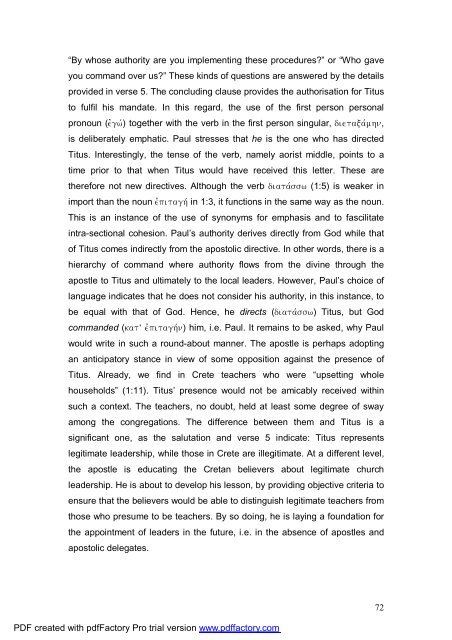A Text centred rhetorical analysis of Paul's Letter to Titus
A Text centred rhetorical analysis of Paul's Letter to Titus
A Text centred rhetorical analysis of Paul's Letter to Titus
You also want an ePaper? Increase the reach of your titles
YUMPU automatically turns print PDFs into web optimized ePapers that Google loves.
“By whose authority are you implementing these procedures?” or “Who gave<br />
you command over us?” These kinds <strong>of</strong> questions are answered by the details<br />
provided in verse 5. The concluding clause provides the authorisation for <strong>Titus</strong><br />
<strong>to</strong> fulfil his mandate. In this regard, the use <strong>of</strong> the first person personal<br />
pronoun (ejgwv) <strong>to</strong>gether with the verb in the first person singular, dietaxavmhn,<br />
is deliberately emphatic. Paul stresses that he is the one who has directed<br />
<strong>Titus</strong>. Interestingly, the tense <strong>of</strong> the verb, namely aorist middle, points <strong>to</strong> a<br />
time prior <strong>to</strong> that when <strong>Titus</strong> would have received this letter. These are<br />
therefore not new directives. Although the verb diatavssw (1:5) is weaker in<br />
import than the noun ejpitaghv in 1:3, it functions in the same way as the noun.<br />
This is an instance <strong>of</strong> the use <strong>of</strong> synonyms for emphasis and <strong>to</strong> fascilitate<br />
intra-sectional cohesion. Paul’s authority derives directly from God while that<br />
<strong>of</strong> <strong>Titus</strong> comes indirectly from the apos<strong>to</strong>lic directive. In other words, there is a<br />
hierarchy <strong>of</strong> command where authority flows from the divine through the<br />
apostle <strong>to</strong> <strong>Titus</strong> and ultimately <strong>to</strong> the local leaders. However, Paul’s choice <strong>of</strong><br />
language indicates that he does not consider his authority, in this instance, <strong>to</strong><br />
be equal with that <strong>of</strong> God. Hence, he directs (diatavssw) <strong>Titus</strong>, but God<br />
commanded (katÆ ejpitaghvn) him, i.e. Paul. It remains <strong>to</strong> be asked, why Paul<br />
would write in such a round-about manner. The apostle is perhaps adopting<br />
an anticipa<strong>to</strong>ry stance in view <strong>of</strong> some opposition against the presence <strong>of</strong><br />
<strong>Titus</strong>. Already, we find in Crete teachers who were “upsetting whole<br />
households” (1:11). <strong>Titus</strong>’ presence would not be amicably received within<br />
such a context. The teachers, no doubt, held at least some degree <strong>of</strong> sway<br />
among the congregations. The difference between them and <strong>Titus</strong> is a<br />
significant one, as the salutation and verse 5 indicate: <strong>Titus</strong> represents<br />
legitimate leadership, while those in Crete are illegitimate. At a different level,<br />
the apostle is educating the Cretan believers about legitimate church<br />
leadership. He is about <strong>to</strong> develop his lesson, by providing objective criteria <strong>to</strong><br />
ensure that the believers would be able <strong>to</strong> distinguish legitimate teachers from<br />
those who presume <strong>to</strong> be teachers. By so doing, he is laying a foundation for<br />
the appointment <strong>of</strong> leaders in the future, i.e. in the absence <strong>of</strong> apostles and<br />
apos<strong>to</strong>lic delegates.<br />
PDF created with pdfFac<strong>to</strong>ry Pro trial version www.pdffac<strong>to</strong>ry.com<br />
72

















